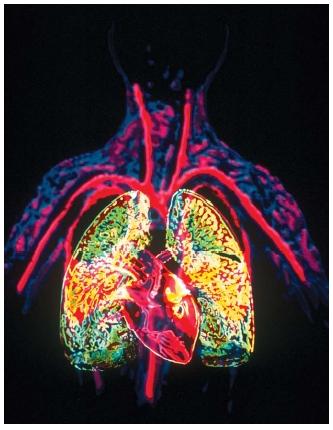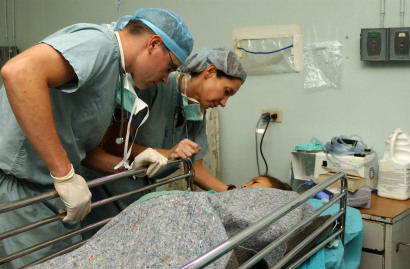 Threats to the circulatory system involve excessive bleeding and/or loss of pulse. Blood is often called the liquid of life. Each blood cell carries food and oxygen to all the body’s tissue. If the blood supply gets too low, or if the blood’s health deteriorates, this transfer of food stops. In a matter of minutes, death can occur. From a spiritual perspective, sinners may be severely wounded by the effects of sin. When the system that gathers nutrients and ingredients that are necessary for life stops functioning, it not only signals imminent death, but healing becomes quite impossible.
Threats to the circulatory system involve excessive bleeding and/or loss of pulse. Blood is often called the liquid of life. Each blood cell carries food and oxygen to all the body’s tissue. If the blood supply gets too low, or if the blood’s health deteriorates, this transfer of food stops. In a matter of minutes, death can occur. From a spiritual perspective, sinners may be severely wounded by the effects of sin. When the system that gathers nutrients and ingredients that are necessary for life stops functioning, it not only signals imminent death, but healing becomes quite impossible.
As we know, the absence of a pulse means the heart has stopped beating. Even with an ample blood supply, or if there is plenty of food and oxygen, life ends when the heart cannot pump the blood throughout the body. A strong heart, however, can keep a person going long after he/she sustains other life-threatening injuries. Spiritually, people who lose heart no longer want to keep up the fight. All hope and desire drains from life. Without the will to win, or the desire to press on, or the conviction that things are going to get better, there is nothing to do but accept defeat. In these cases, the spiritual paramedic makes every effort to stop the bleeding and get the heart pumping again.
Wounds. What can happen to a person to cause deep wounds to the soul? Without trying to over-analyze, it may be useful to classify wounds into three categories.
1. Accidental wounds. “Time and chance happens to all men.” Life itself can sometimes be difficult. People lose jobs, suffer broken relationships, go through financial setbacks, and get hit with any number of disappointments in life. These wounds are painful, but the mind quickly understands the logic and circumstances behind them, and makes the necessary emotional adjustments.
2. Intentional wounds. In contrast to accidental wounds, it is far more difficult to adjust to intentional attacks, such as rape, abuse, rejection, gossip and slander, and other kinds of hurtful behavior. These wounds result from hatred or malice in the heart of another person. The wound is two-fold. First, the actual surface wound itself causes pain. Second, and maybe even worse, is the deeper pain of knowing that someone deliberately did it. Instinctively, the victim asks not only what happened, but why. The second question is much harder to deal with than the first. Even worse, loved ones such as parents, spouses and children often inflict these wounds.
3. Self-inflicted wounds. Health care experts classify wounds to the physical body according to severity. Burns, for example, are said to be first, second or third degree, depending on the extent of the injury to the flesh. Broken bones get classified into simple or compound fracture categories. Cuts or lacerations may be superficial, needing only light bandages, or they may be deep wounds requiring tourniquets, stitches, or extensive care.
In our application, self-inflicted wounds must be judged as a third degree. We must not only treat the actual wound itself, but also we must deal with the complicated reasons why a person wanted to do this to himself/herself. The true motives hide in the fog of past hurts, emotional, psychological and spiritual crises, and ongoing problems. Clear-cut answers seldom emerge fully from this fog. Sometimes, as spiritual caregivers, we might feel sure that we understand the problem only to be thrown into chaos by a new twist to the story. Suicide attempts, self-destructive and self-defeating behavior should be understood as self-inflicted wounds stemming from complex problems.
How can we best help a victim who has been severely wounded by sin? Physically, a wounded person is in a delicate condition. Sudden movement, stress on the heart, careless treatment of tender or open flesh wounds will worsen the problem. Likewise, the person in spiritual pain may slam the door to his/her heart quickly if a well-meaning caregiver is insensitive. We cannot overemphasize the fact that awareness, care and sensitivity are indispensable.
Love. The simplest definitions of love are best in light of our theme. M. Scott Peck makes a powerful point when he says that real love is “the will to extend one’s self for the purpose of nurturing one’s own or another’s spiritual growth.” The Apostle Paul wrote to the Romans, “I long to see you so that I may impart to you some spiritual gift to make you strong—that is, that you and I may be mutually encouraged by each other’s faith.” Romans 1:11-12.
This leaves no room for selfishness, manipulation, or any gesture that is not beneficial to the other person’s spiritual well being. What do we mean, then, when we say that a soulwinner must love the person he/she desires to win to Christ? The following words come closest to the meaning.
Commitment. Commit yourself, not to the whim, favor or goodwill of the person, but to his/her salvation and spiritual healing. While you must use tact and discretion, you should never compromise the ultimate solution for the person simply because you fear you might be offensive.
Giving. “For God so loved… that He gave.” Giving grows out of loving. Give of yourself, your time, your moral support, your spiritual strength, even your physical help, if necessary. Guard against being manipulated, however, because there are people who will use anyone they can for their own selfish aims. Tie all your efforts back to spiritual goals for this person.
Unqualified acceptance. Love like Jesus loved. He declined to condemn a woman taken in the act of adultery. He ate in the house of sinners. He permitted Mary Magdalene, a known prostitute, to wash His feet. He touched a funeral bier, an act forbidden to a rabbi, and raised the widow’s son from the dead. He entered into a cemetery, another act forbidden to a rabbi, in order to raise Lazarus. He let anyone touch him, He healed on the Sabbath, He mingled with the rabble, He continually shocked the religious hierarchy by His unorthodox approach. Yet, Jesus never condoned sin. He distinguished between the sin and the sinner, and determined to show that He loved souls who were debilitated and ruined by sin, even while He disdained their sin.
Compassion. While love, as a positive emotion, extends from your heart to the person in pain, compassion enables you to receive that pain into your own heart, as though you were the one suffering. In fact, compassion actually means, “to suffer with someone.” When the hurting person looks into your eyes, can he/she see that you are absorbing the pain? Compassion animates your prayer life. Without it, you cannot carry the burden for the lost and intercede for them.
Go to bat for them. When an injured person bleeds profusely, someone must apply firm pressure at the point of the wound. In case life or limb is threatened, tourniquets may be required. A victim can only suffer the loss of blood for a limited time. Help is urgent.
In a spiritual emergency, you may need to step into a crisis that swirls around a person, and take over until you find an immediate solution. This may mean keeping someone on the phone until he/she calms down, going to get someone and going out for a soft drink, keeping someone overnight, or helping to work out some other temporary plan to get someone through a crisis. If you have good communication skills, you may need to mediate between this person and someone else. You may need to provide contacts for a person, give him/her transportation, or do whatever is necessary to stop the bleeding.
Because this kind of intervention may be awkward, delicate or even dangerous, you ought to keep some guidelines firmly in mind. Never help a person to do something wrong, even if you are begged to do it. In case you are helping a minor, never oppose the parent or guardian unless a crime is involved. Explain that your purpose is only positive and helpful. In marital disputes, take a person in only if you have reason to believe that his/her life or safety is actually in danger. Never give legal, medical or financial advice unless you have professional credentials. Even with these constraints, however, you can continue to do many practical things that will mean much to the person you want to win to Christ.
Heart.
In order for us to understand the heart from a spiritual perspective, let’s look at the physical organ we call the heart. The human heart is a specialized, four-chambered muscle that maintains blood flow in the circulatory system. Blood supplies food and oxygen to the cells of the body for their life needs and removes the waste products of their chemical processes. Blood also helps to maintain a consistent body temperature, circulate hormones, and fight infections. The brain cells are very dependent on a constant supply of oxygen. If the circulation to the brain is stopped, death ensues shortly.
The role of the heart has long been given elevated importance. The scriptures use the heart to convey the seat of the soul. Other ancient writers thought it was the center of love, courage, joy, and sadness. Primitive man must have been aware of the heartbeat and probably recognized the heart as an organ whose malfunction could cause sudden death.
Metaphorically, if someone “loses heart,” we mean that he/she has no more motivation or inspiration to go on. Someone may be in a race, a fight to save a marriage, a competitive struggle for a position or a job, or even in a battle against a life-threatening disease. Suddenly, this person quits. It is as if somebody turns off the switch and everything grows dark. “I can’t go on” and “it’s no use,” and other negative phrases are heard. This person loses the required strength and willingness to face life. Hope for future goals disappear. Nothing seems like it’s worth the effort. When this happens, one virtually ceases to live.
Without the heart to go on, life either becomes meaningless or impossible. Unsaved people frequently battle with these feelings. Some sink into a sea of melancholia. Others grow cynical about all the people and circumstances around them. Still others retreat into self-pity. If these symptoms reach a severe point, such people may suffer clinical depression. The caregiver should respond with alarm if a person experiences extreme sadness, pessimism, guilt, self-dislike, self-accusation or suicidal ideas, which persist for a long period and interrupt the normal functioning of life. If so, professional help may be in order. The soulwinner must not play amateur psychologist or psychiatrist.
What should the spiritual caregiver do, then, to help a person who loses heart? Let’s concentrate on three areas: the worthwhileness of life, the love of God which involves God’s specific will for each life, and life really does get better with Christ as Lord. In each area, you must give hope, show faith and express your belief in God’s power.
Life is worthwhile . People who lose heart may despair of life. If talk of suicide comes up, counter it firmly by using scriptures, which show that life is God’s gift. Again, unless you are a skilled or professional counselor, avoid getting into the depths of a person’s problems. You will do far better by staying in the province of scripture and prayer.
- “And God said, Let us make man in our image, after our likeness: and let them have dominion over the fish of the sea, and over the fowl of the air, and over the cattle, and over all the earth, and over every creeping thing that creepeth upon the earth. “So God created man in his own image, in the image of God created he him; male and female created he them.” Genesis 1:26-27.
- “I will praise thee; for I am fearfully and wonderfully made: marvellous are thy works; and that my soul knoweth right well.” Psalm 139:14
- “Thou shalt not kill.” Deuteronomy 5:17
- “Thou hast granted me life and favour, and thy visitation hath preserved my spirit.” Job 10:12
Often, a person contemplating suicide seeks for “permission” from someone he/she trusts. That’s why you should show that the Bible expressly forbids it. This places a huge barrier in the way. Next, it is important to show that life is not only worth saving, but it is worth living. These scriptures can help demonstrate this.
“Before I formed thee in the belly I knew thee; and before thou camest forth out of the womb I sanctified thee, and I ordained thee a prophet unto the nations. “Then the LORD put forth his hand, and touched my mouth. And the LORD said unto me, Behold, I have put my words in thy mouth. “See, I have this day set thee over the nations and over the kingdoms, to root out, and to pull down, and to destroy, and to throw down, to build, and to plant.” Jeremiah 1:5, 8-10.
The Love of God. Assure the people you deal with that God’s unselfish, eternal love includes them. While they may not believe that God hates them, they may feel ignored, left out, or that they are non-persons. Without an assurance of God’s love, they have no deep-rooted sense of security or purpose in life. Communicate the following truths:
- God is love.
- God uniquely created each person.
- God loves man in spite of sin.
- Love caused God to find a way to redeem man from sin.
- God provides for each person.
- Every good gift comes from God.
- God’s love is unsolicited and voluntary.
- God’s love is unconditional.
- God’s love is eternal.
As you share these truths, you offer hope, encouragement and affirmation. Keep in mind that those you talk to may have never had anything but abuse, put-downs and neglect given to them. Your message of love and hope can become a powerful force in their lives. Here are some scriptures that express God’s love to man.
- “Greater love hath no man than this, that a man lay down his life for his friends.” John 15:13
- “But God commendeth his love toward us, in that, while we were yet sinners, Christ died for us.” Romans 5:8
- “Who shall separate us from the love of Christ? shall tribulation, or distress, or persecution, or famine, or nakedness, or peril, or sword? “Nor height, nor depth, nor any other creature, shall be able to separate us from the love of God, which is in Christ Jesus our Lord.” Romans 8:35, 39.
- “Hereby perceive we the love of God, because he laid down his life for us: and we ought to lay down our lives for the brethren.” I John 3:16
- “Herein is love, not that we loved God, but that he loved us, and sent his Son to be the propitiation for our sins.” I John 4:10
The Word of God and your own words, combined with your attention and kind action massage the heart back into activity. When the blood starts flowing, temperature will rise, color will return and the victim will experience a renewed desire for life.
Life always gets better when Jesus becomes Lord. When people are in the grip of pain and despair, they tend to develop negative attitudes about their lives in general. It appears to them that everything is bad and getting worse. Present frustrations get blown out of proportion and destroy all hope for the future.
The soulwinner must counteract these negative feelings with the Word of God. Assure this person that his/her life will be vastly different the moment Jesus Christ becomes Savior and Lord. Point out the positive changes that Jesus makes in a believer’s life. Even if this person stubbornly resists such positive talk, do it anyway. Do not back down. A soulwinner must commit to being an unmovable fortress of strength for the benefit of the lost.
Plenty of scripture verses lend themselves to this effort. Learn some of them to help you show a person that his/her life will improve after salvation. Here are a few of them.
- “On the last and greatest day of the Feast, Jesus stood and said in a loud voice, “If anyone is thirsty, let him come to me and drink. “Whoever believes in me, as the Scripture has said, streams of living water will flow from within him.” John 7:37-39
- “I am the gate; whoever enters through me will be saved. He will come in and go out, and find pasture. “The thief comes only to steal and kill and destroy; I have come that they may have life, and have it to the full.” John 10:9-10
- “Come to me, all you who are weary and burdened, and I will give you rest. “Take my yoke upon you and learn from me, for I am gentle and humble in heart, and you will find rest for your souls. “For my yoke is easy and my burden is light.” Matthew 11:28-30
 Wednesday, October 10, 2007 at 12:56PM
Wednesday, October 10, 2007 at 12:56PM 




